Why is breaking codependency so important for your mental health and the health of your relationship? To address this question, I want you to imagine you’re on a see-saw with your partner. But instead of the fun of swinging up in the air and the excitement of a ‘touchdown’ with a thud, what if you either stay stuck up in the air or remain grounded throughout? What if the positions never change?
Well, the see-saw wouldn’t be fun anymore. In fact, after a while, it would feel painful and immensely boring too. Your legs would hurt, your fingers might feel sore and your heart would surely not feel the joy anymore. This is exactly what codependency in a relationship feels like — painful, lopsided, boring, unfair, and with no excitement whatsoever. Codependent relationships are when one partner is always the “caretaker” and the other partner is forever the “taker”.
This dynamic often becomes addictive, triggering a vicious cycle that feeds itself. Research shows that codependent tendencies often stem from childhood experiences and dysfunctional family dynamics. This may make you wonder, can you fix a codependent relationship?
While there is no denying that such relationships are dysfunctional, they can become healthy if the partners decide they have to work toward overcoming codependency. To shed light on this complex relationship dynamic, Swaty Prakash, a communication coach with certification in Managing Emotions in Times of Uncertainty and Stress from Yale University and a PG Diploma in Counseling and Family Therapy, writes about the signs of codependency and how to overcome codependency in relationships.
What Is Codependency In Relationships?
Table of Contents
The perfect recipe for a near-perfect relationship is when partners are in a healthy symbiotic relationship where they both give and take, have healthy boundaries, and can function together but are not helpless alone either. One of the main codependency symptoms is that this balance is missing and scales are tipped in favor of one partner. One partner’s needs and desires take up all the space, and the other partner, with an urge to be needed, exhausts all their love and energy in taking care of them. What is at stake is their own physical and mental health and their own needs.
Such codependent symptoms are often seen in relationships involving people with drug or alcohol addiction. A partner with addictive behavior looks fragile, and the other partner feels responsible for their well-being. They brush aside their own needs and start piecing together the one who’s broken. It all looks healthy and with good intentions in the beginning. This, however, changes soon when the caretaker’s own needs start to fade, and becomes a one-sided relationship.
Research that compared wives of addicts with normal women found that the former showed more agreeability and adapted more for marital stability than their counterparts in normal marital bonds. In short, the codependency meaning boils down to a lop-sided relationship where one partner becomes practically invisible.
Codependent tendencies don’t emerge in a vacuum. A lot of people who show signs of codependency have grown up in families where one or both parents either have drug or alcohol addiction or are missing due to other reasons. They could be busy making ends meet, suffering from severe mental or physical health issues, fighting addictions and substance abuse issues, or something else that took most of their time. Children in such dysfunctional families often grow up walking on eggshells, neglecting their own care, and instead taking care of others’ needs to feel wanted and worthy.
More often than not, children with parent(s) who had issues with substance abuse or were alcohol-addicted grow up to exhibit codependent behaviors. Even as children, they would feel responsible for their parent’s actions. Quite early in life, they had learned that to placate their angry parents, they needed to either be the enabler of their addiction, their punching bags, or become invisible. This fear of being abused, neglected, or not loved remains rooted in them even as adults, and they often don’t have a clue about where to begin breaking codependency.
Related Reading: 8 Relationship Problems You Can Face If You Had Toxic Parents
7 Signs Of Codependency In A Relationship
One of the classic codependency symptoms is the vicious cycle that exists between the caretaker and the taker. While one partner needs someone to take care of them, the other partner wants to be needed. Before we discuss how to overcome codependency, it is important to understand the psychology behind it. Psychologists find that most such relationships are between a partner who has an anxious attachment style and one who has an avoidant attachment style.
People with an anxious attachment style are often needy and with low self-esteem, which is why codependency and anxiety often go hand-in-hand. Studies suggest that people with this attachment style live with a fear of abandonment and often feel that they are unworthy of love. They become the caretakers to feel worthy and important in the relationship.
On the other hand, those with an avoidant attachment style are individuals who score high on self-esteem but quite low on emotional quotient. They feel uncomfortable with too much intimacy and are almost always ready with an exit plan. Ironically, the ones with an exit plan usually hold the reins of the relationship while the anxious ones always let the others control them.
Oftentimes, much before the partners, people around them sense the skewed power dynamics rooted in codependent attachment. It is only when the caregiver is exhausted and feels empty that they realize that they are in an unhealthy relationship and think of breaking codependency. If you’ve ever wondered, “Am I codependent?”, it’s vital to be aware of the potential red flags. Here are a few signs of codependency to look for:

1. There is a lack of genuine communication
In codependent couples, the caregiver is often a people pleaser. They feel compelled to say things to placate or please their partner. On the other hand, the taker is always on the defensive and never wants to share their true feelings. Research shows that the takers often exhibit passive-aggressive behaviors. While they don’t outright ask for the giver to fulfill all their needs and wants, they get angry when the giver doesn’t.
2. Exaggerated sense of responsibility
Codependency in a relationship boils down to the caretaker assuming complete responsibility for their partner’s life. This is often the only way they feel fulfilled. If you’ve ever asked yourself, “Am I codependent?”, notice if you display the following behaviors:
- You feel excessively responsible for your partner’s well-being
- You think your partner can’t take care of themselves
- You are sure that you need to save them, even from themselves
- You jump to help them, even if they haven’t asked for help
- You feel hurt if they seem to function without your assistance
Related Reading: Freedom In Relationships – What It Means And What It Doesn’t
3. Saying “no” is not an option
Do you ever feel like you would be loved less if you refused to fulfill any of your partners’ demands? Do you find it extremely difficult to say “no” even if that is what your heart wants? In relationships involving codependent partners, the partner’s need to fit in every situation to feel loved, liked, and accepted is so huge that they almost dissolve their own identity in an effort to merge. Selma, a participant in a study on codependency experiences, said, “… it is like the chameleon, you know, trying to fit in with every situation rather than allowing myself to be who I am…”.
4. Taking time out for yourself feels selfish
Codependent partners do not know how to prioritize themselves. People with codependent personalities often:
- Spend all their time taking care of their partners’ needs
- Don’t ever list their own needs as a priority
- Feel guilty if they have time for self-care
Meanwhile, the other partner may show resentment, and even make them feel guilty for “not taking care of them” or “abandoning them”. A vicious circle that gets in the way of overcoming codependency.
5. Codependents are often worriers and anxious
Codependents are constantly worrying because they tend to be attracted to people who need support, care, protection, and self-regulation. Besides, codependent partners are often confused about the status of their relationship. This is also why codependency and anxiety often co-exist.
With no genuine communication between the partners, an absolute lack of respect, and an absence of healthy boundaries, the codependent relationship is always on tenterhooks. To add to the woes, codependent partners feel a lack of balance in life, feel emotionally unstable, and always live in the fear that they are not good enough. All of this makes overcoming codependency that much harder.
Related Reading: 11 Examples Of Self-Sabotaging Behaviors That Ruin Relationships
6. Leaving the partner is not a choice
Research shows that despite all the stress and unworthiness that come with such relationships, codependent personalities are often not willing to call it quits. Psychologists say that codependency is the worst form of addiction, with partners being addicted to being looked at as martyrs or victims.
Besides, the fear of never finding love again or the deep-rooted belief of being “unworthy” makes it almost impossible for the codependent partners to step out of the relationship. Every time someone tries to convince them that they are in an unhealthy relationship, the codependent partners often use the phrase, “I know but…”. This “but” is what stops them from giving up or calling it quits.
7. Codependent partners can’t make decisions alone
Codependent people are in constant need of external validation, especially from their partners. They need to be told that they are not wrong plague their self-confidence and hit their decision-making abilities hard. Codependent partners:
- Don’t trust their skills
- Are fearful of making wrong decisions
- Are scared of offending their partners with their decisions
- Always want someone to validate their decisions
- Can only enjoy life if they are the givers

11 Expert-Backed Tips For Breaking Codependency In Relationship
Once you notice the signs of codependency, the next question is — can you fix a codependent relationship? Yes, but the process of breaking codependency patterns is a long one and needs a lot of self-care. Take the case of Grace and Richard, discussed by counseling psychotherapist Dr. Nicholas Jenner.
Grace and Richard were married for thirty years. Richard was a covert narcissist and knew all the textbook tricks to manipulate Grace. Grace, on the other hand, displayed full-blown codependent tendencies. She often confused her sacrifices and martyrdom with her love for the family.
An otherwise timid person with no self-esteem, she used her enabling attitude to exert power and control over the family, or this is what she thought. In reality, Richard was manipulating her, and letting her control the family only as much as he wanted. Due to his addiction, he joined Alcoholics Anonymous but soon left the group. He had multiple affairs, but every time Grace questioned him, he blamed her for everything, including his attraction to other women.
Related Reading: 18 Subtle Signs Your Long-Term Relationship Is Over
Grace felt guilt for everything, including her husband’s many affairs. When their only son left home after graduation, Grace suffered from empty nest syndrome. With Richard becoming a recluse and hardly being home, and with the son gone, she started showing signs of anxiety and depression. Even though she didn’t know the real issue, her gut wanted her to break codependency habits.
They realized the need for professional intervention and went into therapy. Grace soon realized her codependent symptoms. Now that she could see the patterns, she wanted to know how to stop being codependent. The recovery process was long and often difficult for her to see her own demons but she ultimately decided to separate from Richard and is now living her life as a successful businesswoman.
Since a lot of these relationships involve an addict and only worsen with time, the fears of a codependent relationship turning abusive and violent are very real. Breaking codependency habits is difficult but absolutely important. So if you are wondering how to overcome codependency, research proves that resilience and self-reliance are vital. Here are eleven ways in which you can break codependency and heal.
1. Question your intentions, ask tough questions
The journey of figuring out how to stop being codependent starts with you. If you have, at times, wondered, “Am I codependent?”, the above-mentioned signs may have offered you clarity on where you stand. Don’t brush off these codependency symptoms because introspecting yourself makes you uncomfortable. It can also help you if you’re wondering how to stop being codependent.
Sit back and look at your behavioral patterns over the years. Codependency is an acquired behavior that often begins in early childhood. To begin with, ask yourself these questions. They are just about you, and you need to answer them honestly to know yourself:
- As a child, did I have to fend for my own emotions?
- As a child, was I the one everyone looked after or was it the other way round?
- Was I always drawn to people who needed help and care?
- Am I scared that one day I might not be needed by anyone?
- Do I love myself or pity my existence?
- Do I like being in the position of enabler?
There are hordes of questions you can ask. But with every question, there might be an emotional upheaval so start slow, but be honest. If the answer to all or most of these questions is an ugly, in-your-face “yes”, it is time to accept that you are in a codependent relationship, and it is time to break free from this toxic relationship pattern.
2. Stop feeling overly responsible for your partner
Remember the character of Julia Roberts in Runaway Bride? She constantly changed her needs and preferences based on her partners’ needs. So much so that no one even knew what kind of eggs she actually liked! Well, such behavior pretty much sums up the codependency meaning.
If you can relate to it, then the process of breaking the cycle of codependency begins with learning to voice your needs without feeling excessively responsible for your partner’s emotions and reactions. Let your partner know what your preferences are, and tell them if you like your eggs sunny side up or scrambled. The point is, be unapologetic about your needs. Don’t feel:
- Guilty about having different choices
- Fearful that you would be loved less if you voiced your feelings
- Like you have failed if you can’t fix their problems
- Responsible for their flaws, failures, or feelings
Related Reading: Giving Too Much In A Relationship? How Much To Give Of Yourself
3. Learn to express your wants and needs
Once the acceptance of your codependent behavior is in place (it will keep swaying between acceptance and confusion for a long time), it is time to initiate honest communication with your partner. This is one of the most crucial codependent no more activities you can undertake to heal and fix your relationship.
So far, you have always said what you thought they wanted to hear, or what you believed would keep you in control, and out of trouble. But not anymore. Let them know that you cannot and would not be an enabler of their addiction/behavior anymore. Here are some ways to put across your thoughts.
- Use “I” statements: Instead of putting them in the picture, share your thoughts and feelings using “I” statements. For example, “I feel tied down working 24*7”, “I feel alone taking care of everything”, or “I want some time to meet my needs” are some statements you can use to convey that you want to build healthy relationship patterns
- Don’t get in the blame game: Be prepared to have a tough conversation. Instead of blaming them for your codependency, talk about solutions. For example, if you are living with an alcoholic partner and you have been an enabler all these years, say, “I am here for you but I can’t help you with everything”
- Tell them what you want: You must let your partner know the picture you have in your mind. In clear, honest terms, let them know what you expect from the relationship. It is not as easy as it sounds. Your partner has spent all these years as per their notion and whims, so you telling them what you want will not be taken kindly. But be firm, honest, and clear.
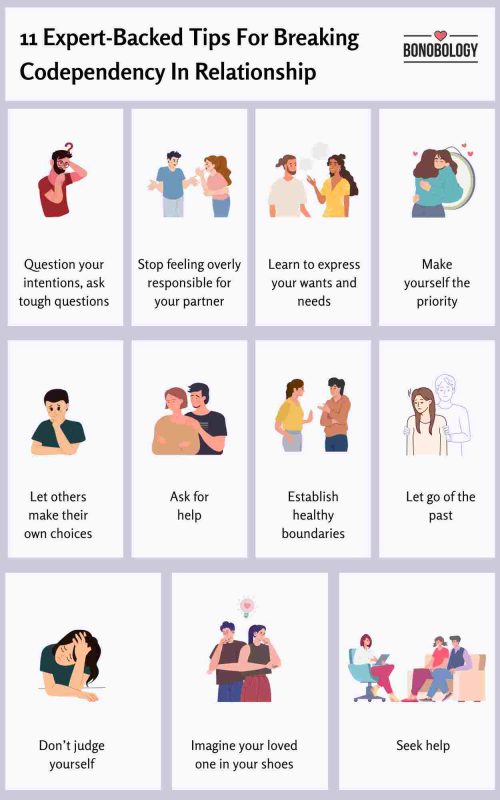
4. Make yourself the priority
Codependent partners spend so long taking care of others’ needs and fitting into their reality that they have an extremely blurred self-identity. When trying to ascertain how to stop being codependent, you must work on rebuilding your “self”. Self-care and self-love are the two magic tools that can boost a person’s sense of self. They are the antidote to codependency.
When did you last call your friends and make a dinner plan? When did you last order food that you loved or watched a musical concert of your favorite singer? It is time to do all this and much more. To break the cycle of codependency, you need to make yourself a priority. Remember the saying, “Be your own superhero and save yourself”? Well, you need to do exactly that.
Related Reading: 9 Consequences Of Staying In An Unhappy Marriage
5. Let others make their own choices
Take off the invisible hats and let your partner and other family members make their own choices. You would feel hurt when you realize that “you aren’t needed anymore”, but this is exactly what is required. You need to step out of the enmeshed relationships and establish boundaries. Instead of compulsively trying to fix things for others or making choices for them, allow them to make their own choices. This is absolutely imperative for breaking the cycle of codependency.
6. Ask for help
Asking for help should be easy, isn’t it? Well, ask someone who displays codependent behaviors and they would tell you how their vocal cords get twisted and stomachs churn if they ever need to seek help. People with codependent tendencies are already shadowed by their sense of worthlessness. If they are in a situation where they need help, they feel that all their fears have come true, and they are now exposed.
They feel that by being in a place of need, they are letting their partners know how incapable they are. If you grapple with such thoughts, its crucial to remind yourself that asking for help needs strength. To be in a vulnerable state requires an immense sense of self-worth. Also, a lot of narrative around this fear is often more perceptual than real.
7. Establish healthy boundaries
Codependent people often suffer from abuse because they are not able to set firm and healthy boundaries and let people intrude into their space time and again because they tend to be neither assertive nor confident. So, establishing healthy boundaries with your partner is important for overcoming codependency. Set boundaries for a healthy relationship in a calm state of mind. And remember,
- Don’t be apologetic or over-rationalize when setting boundaries
- Even if your partner doesn’t approve of it, do it anyway
- Ensure that there is no ambiguity or soft ends in your boundaries
- Make sure to not overstep yourself and confuse others
- Make it about your partner too. While setting boundaries for yourself, you need to talk them into setting their own too
There are no important or insignificant boundaries, only healthy and unhealthy ones. For example, if you want to set a boundary that you wouldn’t lie to your family members or your partner’s family about their drinking habits, be clear about it. Tell them that you wouldn’t fall into the guilt trap anymore and wouldn’t cover for them.
Related Reading: 10 Biggest Priorities In A Relationship
8. Let go of the past
Codependent people often have had a difficult childhood, devoid of much care and riddled with difficult situations. A continuous sense of helplessness, along with the constant need to be loved, can leave a lasting impact on anyone. So, be kind to yourself and let go of your past.
Let yourself know through positive self-talk and relationship affirmations that you are worthy, and how others treat you is a reflection of who they are, and not you. So, whether your parent/s were unavailable due to high-demanding jobs, or their addiction, or because they were physically or mentally incapable — none of it was your fault yet you had to bear the consequences.
Be kind to your childhood, maybe write a letter to your younger self to calm them down, and move on. This is one of the most effective strategies for anyone trying to figure out how to stop being codependent. Letting go will help you heal from within and fix unhealthy patterns rather than merely trying to suppress them (that never works). Till you have understood and accepted your worth, you won’t be able to figure out how to overcome codependency.

9. Don’t judge yourself
Codependents are one of their own biggest critics. They are constantly judging their actions or inactions and blaming themselves for even wanting to change their behavior. As psychologists, we often tell our clients to be a little less harsh on themselves and not judge their every move. Here is one of the simplest codependent no more activities you can try to make that happen — tell yourself every day:
- I am a good person and I do what I feel is the best
- I cannot control every situation and every result
- I am capable of making decisions
- The result does not decide if a decision is good or bad
- I don’t need validation from others to believe in myself
- I will be kind to myself
- How I treat myself decides how others will treat me
Related Reading: Making Peace With Your Past – 13 Wise Tips
10. Imagine your loved one in your shoes
The answers you are looking for are often within the folds of your own experiences and wisdom. But finding those answers there is a huge task. If you display signs of codependency and want to know how to heal, there is a simple yet very effective exercise we recommend.
Close your eyes and imagine your nearest or most loved one in your shoes. Imagine them doing things exactly as you do, and being treated exactly the way you are treated by your partner. Watch them go through the life that you are living now. Think of an especially potent incident around codependency, and imagine them there.
Did you open your eyes almost in a split second? Did you feel incapable of watching them as you? Were you in a hurry to open your eyes and felt grateful that it was just your imagination? Your answer to these is probably a “yes”. So, think of what you would have advised them or wanted them to do. That is your cue to move forward too.
11. Seek help from friends, peer support group
Oftentimes, much before codependent people realize their shortcomings as a giver, their friends and well-wishers sense it. It is important to listen to these people, talk to them, and let them help you. Tell them about your action plan, and ask them to facilitate it for you if they can. Remember, don’t suffer in silence anymore.
Besides, it is important to have a safe space and peers you can talk to, without the fear of being judged and with the comfort of being understood. There are codependent peer groups as well — for instance, like Alcoholics Anonymous for addicts, there is Al-Anon for the families — to help in the recovery process. Sometimes, pulling each other up is one of the best ways for self-healing too. Also knowing that you are not the only one to feel this way can be one of the first steps to healing.

Stages Of Codependency Recovery
Codependent partners can recover but like all healing, this too won’t happen overnight. It can take anywhere from weeks to months depending on the level of codependency and the time and effort dedicated to getting better. The key is to be patient and be happy with small improvements rather than chasing big ones. In your recovery journey, you’ll find yourself going through the following stages:
- Awareness: You realize you have a codependency issue
- Action: You actively work on bettering yourself
- Improvement: You will find that you have grown and are better now
Key Pointers
- Codependent relationship is when one partner’ needs take up all the space, while the other partner takes up the role of caretaker
- The giver feels the need to be needed and puts their own needs and interests aside while taking care of others
- Codependency is an acquired behavior often seen in people with a difficult childhood
- Spouses of people with addiction issues often become the enabler of their partners and feel “worthy” and “needed” while doing so
- Codependent partners have very low self-esteem and such relationships often become abusive
You Can Find A Way Forward
By now, you must have understood if you have codependent tendencies. It is important to remember that codependency is an acquired behavior, and with consistent as well as mindful methods, breaking codependency is possible, and important. There is ample help available. With talk therapy as well as help from friends and self, breaking free from this vicious cycle of codependency is possible. All you need to do is have the self-confidence and strength to put your needs above others, for once.
How To Stop Being Codependent In A Relationship – Expert Explains
Your contribution does not constitute a charitable donation. It will allow Bonobology to continue bringing you new and up-to-date information in our pursuit of helping anyone in the world to learn how to do anything.

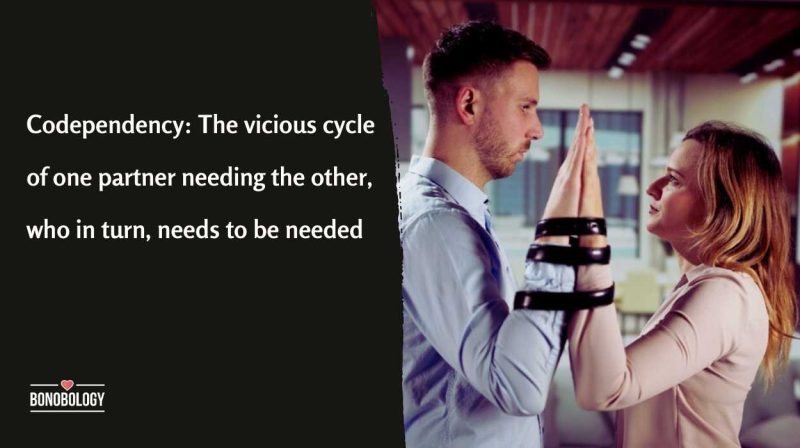



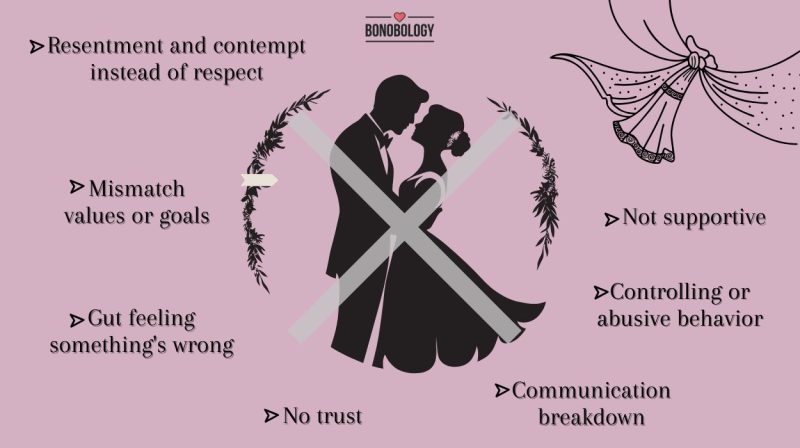

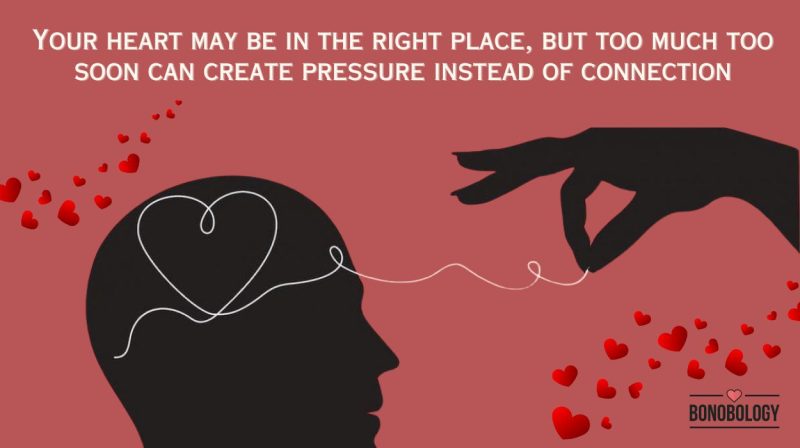

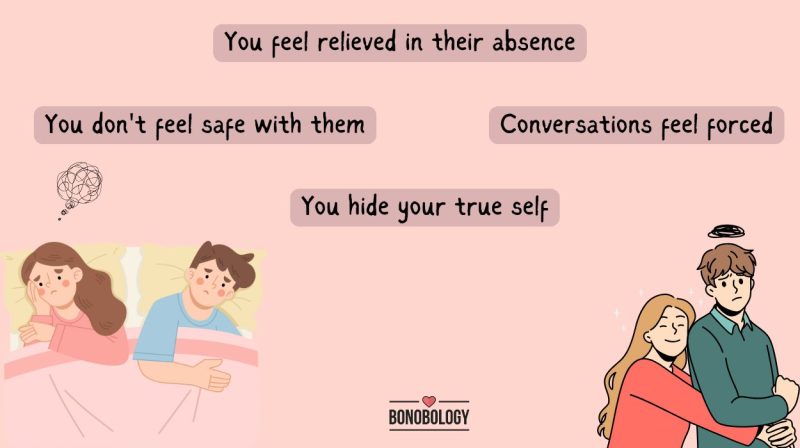




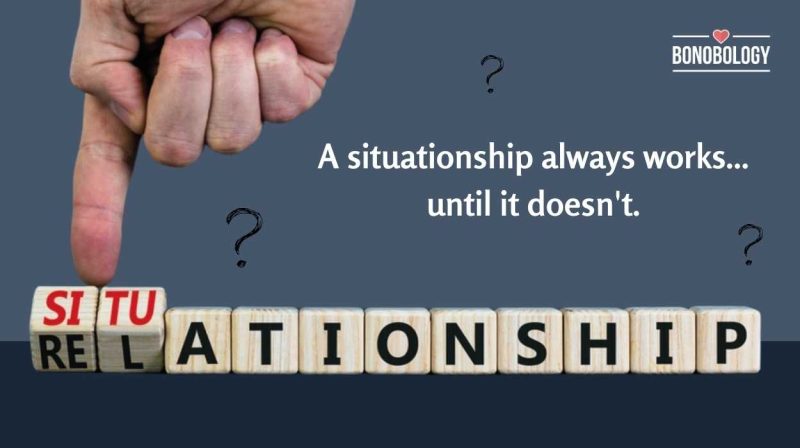

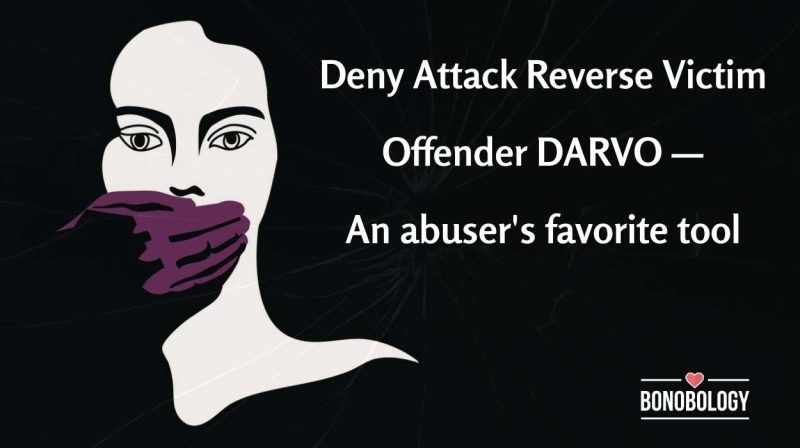

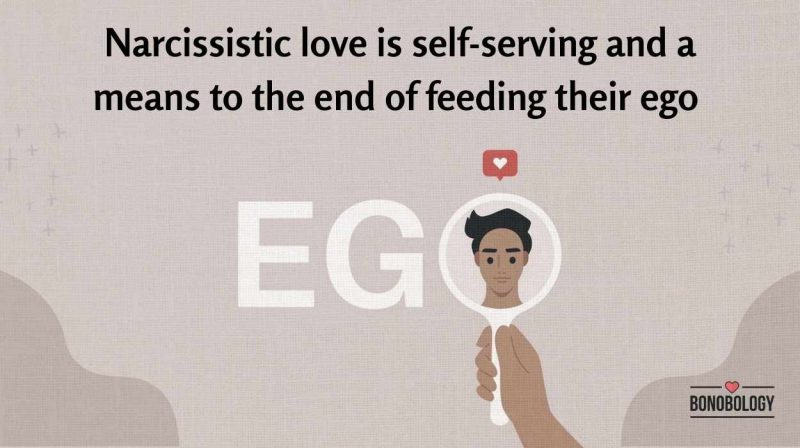
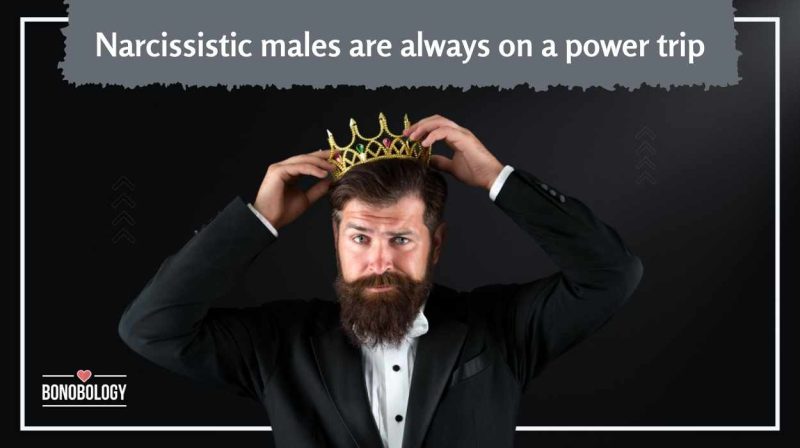
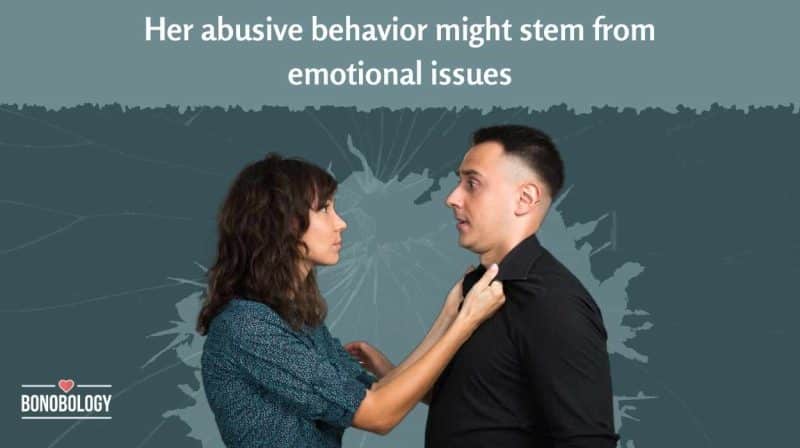
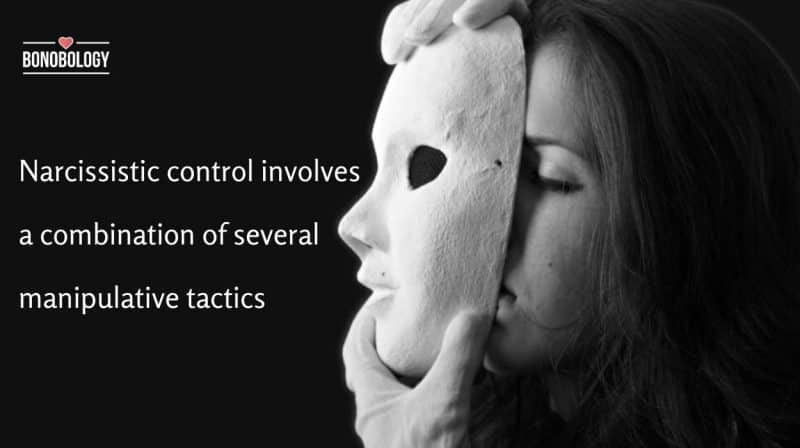
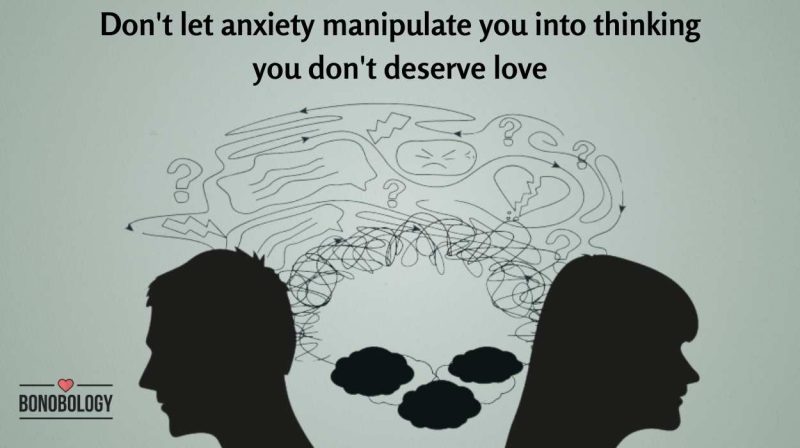
Featured
17 Red Flags In A Relationship To Be Wary Of
What Is A Trophy Wife?
7 Signs You Should Not Marry Him
Signs A Guy Is Obsessed With You In A Bad Way: 15 Red Flags
Unintentional Love Bombing: 9 Ways You May Be Overwhelming Your Partner
13 Signs Of A Hot And Cold Relationship & How To Break The Pattern
21 Subtle Signs You’re Not Really In Love With Your Partner
I Hate My Girlfriend: Why You Feel This Way And What To Do
When Health Challenges Affect Your Relationship Dynamics
5 Harsh But True Signs He’ll Never Marry You
21 Signs That You Are Alone In A Relationship
11 Situationship Red Flags You Should Know About
Why Do I Get Attached So Easily? 9 Possible Reasons and Ways to Stop
How To Respond To DARVO: Expert Lists 7 Strategies
What Is Fexting, And Why Is It Bad For Your Relationship?
Are Narcissists Capable Of Love?
11 Prominent Male Narcissist Traits to Watch For
Why Does My Girlfriend Hit Me? Expert Shares 11 Possible Reasons And Ways To Cope
How Does A Narcissist React When They Can’t Control You?
“My Anxiety Is Ruining My Relationship”: 6 Ways It Does And 5 Ways To Manage It